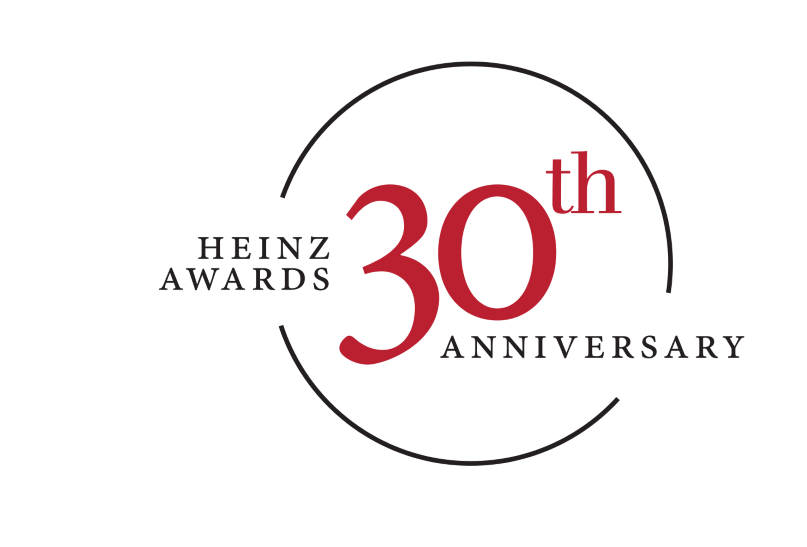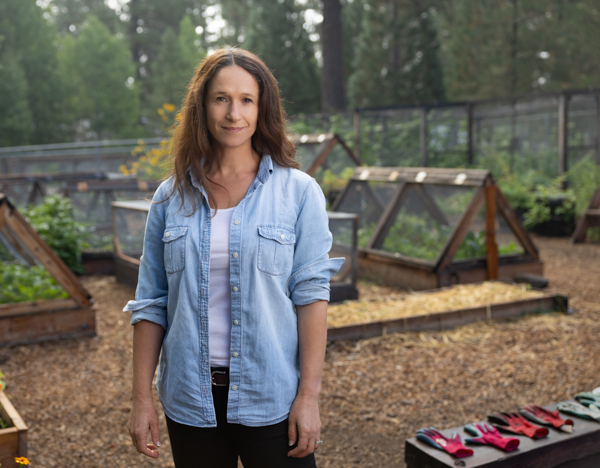
Catalyzing Solutions to Food Waste and Addressing Environmental Injustice Through Community-Led Action: Heinz Family Foundation Names Dana Gunders and Sacoby Wilson Recipients of the 30th Heinz Awards for the Environment
Press Release
September 16, 2025
PITTSBURGH, September 16, 2025 — The Heinz Family Foundation today named Dana Gunders and Sacoby M. Wilson, Ph.D., recipients of the prestigious 30th Heinz Award for the Environment. As part of the accolade, Ms. Gunders and Dr. Wilson will each receive an unrestricted cash award of $250,000.
Dana Gunders has dedicated her career to catalyzing national awareness of the scale of food waste in the U.S. and to working with industry, policymakers and consumers to activate solutions. Her work is helping food businesses reduce waste in their operations, educating policymakers, and promoting the adoption of sustainable food system practices to reduce landfill waste and associated greenhouse gas emissions, along with the economic and social benefits associated with reducing food waste.
Ms. Gunders authored the 2012 groundbreaking report “Wasted: How America Is Losing Up to 40 Percent of Its Food from Farm to Fork to Landfill” while working as a senior scientist at the Natural Resources Defense Council. In partnership with the Ad Council, she helped launch the Save The Food campaign, providing consumers with simple strategies to reduce waste in their own kitchens. She is president of ReFED, a national think tank that fosters data-informed action and works with food businesses, farmers, policymakers, researchers and funders to stop the systemwide problem of food waste.
ReFED’s most recent report, “From Surplus to Solutions: 2025 ReFED U.S. Food Waste Report,” assesses annual food waste in the U.S. — 73.9 million tons, equivalent to 31% of the national food supply.
“About one-third of food in the U.S. goes uneaten,” said Ms. Gunders. “That’s like leaving a grocery store with three bags, dropping one in the parking lot and never bothering to pick it up. Growing that uneaten food would take a farm bigger than California and New York states combined and would use an enormous amount of water, energy and other resources. That wasted food also leads to greenhouse gases exceeding the amount produced by 50 million cars each year.”
“Fortunately, taking action has immediate results. Food that we don’t waste today is food that does not go to landfills tomorrow and avoids the production of methane gases that would otherwise occur within months.”
ReFED’s successes include work with West Coast grocery stores in the Pacific Coast Food Waste Commitment, which has resulted in a 30% reduction in surplus food in their operations from 2019-2023. The organization’s Catalytic Grant Fund is accelerating solutions on the ground and has regranted approximately $3 million to 21 organizations.
As a founding member of the Zero Food Waste Coalition, a nationwide coalition of more than 300 members highlighting the critical role of policy in advancing food waste solutions, ReFED also works to educate policymakers on the impact of solutions such as organic waste bans, which a growing number of states have now enacted, and standardized date labels, which was just introduced at the federal level to reduce consumer confusion and unnecessary waste.
“We honor Dana for her tenacity in bringing actionable solutions to the issue of food waste and visibility to the significance of its environmental impacts,” said Teresa Heinz, Chairman of the Heinz Family Foundation. “Dana’s steadfast conviction that food waste — despite its scale — is a problem that we can solve has inspired a global movement, paving the way for a healthier future for people and planet.
“We honor Dana for her tenacity in bringing actionable solutions to the issue of food waste and visibility to the significance of its environmental impacts.”
— Teresa Heinz
Sacoby Wilson, Ph.D., is a nationally recognized environmental health scientist and environmental justice advocate whose work combines scholarship, science and community engagement to confront practices and policies that harm people in frontline and fenceline communities — neighborhoods located near polluting facilities. He has spent his career investigating how industrial practices, pollution and climate change disproportionately affect the health of people of color and residents of low-income neighborhoods. He also continuously works to “INpower” communities to achieve justice.
Dr. Wilson is a professor in the Department of Global, Environmental and Occupational Health at the University of Maryland School of Public Health, where he founded and directs The Health, Environmental and Economic Justice (T.H.E. EJ) Lab. For 25 years, his work has spanned exposure science, environmental health disparities, community-engaged research, air and water quality, the built environment, industrial animal production and climate change. He collaborates with grassroots groups, health practitioners, agencies and policymakers to spotlight hazards and inequities in planning, zoning and development practices that pollute and harm the health of low-wealth communities.
His research has documented air pollution from industrial hog farms in the Carolinas, inadequate sewer and water infrastructure in underserved Black neighborhoods, and cumulative pollution burdens in Maryland’s industrial corridors and the Chesapeake Bay region.
A pioneer in community science, Dr. Wilson co-developed hyperlocal air quality monitoring networks with community-based organizations, local governments and agencies to measure pollutants in overburdened communities. He has developed mapping tools such as the Maryland Environmental Justice Screening Tool (MD EJSCREEN) and Mid-Atlantic EJSCREEN to visualize environmental justice scores at the census tract level. By involving residents directly in data collection, analysis and translation, his work has advanced environmental justice science, expanded the role of community-led research, strengthened advocacy for air quality standards and influenced state and federal policy. Dr. Wilson also directs the Mid-Atlantic Climate Action Hub (MATCH), which provides mini-grants, training and advocacy for communities disproportionally affected by climate change.
“For generations, people of color and low-income communities have been marginalized and invisibilized, their neighborhoods used as dumping grounds for industrial hazards and pollution,” said Dr. Wilson. “These toxic exposures can harm people across their life course, and climate change will make these conditions and health inequities worse. Many communities distrust well-funded academic institutions, having endured decades of broken promises from researchers who fail to understand their lived experience. My work deploys science of the people, for the people and by the people. It is built on trust, respect, transparency and open communication, and uplifts the principle of representative justice. It’s about applied, action-oriented science for justice and social change.”
In 2023, Dr. Wilson founded the nonprofit Center for Engagement, Environmental Justice and Health INpowering Communities (CEEJH INC) to expand on his university-based work. Today, CEEJH INC is a national leader in addressing environmental inequities through far-reaching advocacy, annual summits, education and training programs, and engagement with policymakers.
“Sacoby is honored for his scholar activism, his commitment to addressing the burden of environmental, climate and energy injustices on vulnerable populations, and his deep concern for humanity,” said Teresa Heinz, Chairman of the Heinz Family Foundation. “A tireless and passionate advocate for those suffering from the physical, social and mental impacts of pollution and toxic exposures, he is deploying his expertise as a public health scientist to create a future in which everyone has equal access to clean air, water and land.”
“Sacoby is honored for his scholar activism, his commitment to addressing the burden of environmental, climate and energy injustices on vulnerable populations, and his deep concern for humanity.”
— Teresa Heinz
Created to honor the memory of the late U.S. Senator John Heinz, the Heinz Awards celebrate excellence and achievement in areas of great importance to Senator Heinz. The 30th Awards bring the total number of recipients to 186 and reflect more than $32 million in awards since the program was launched in 1993. .png) Additional recipients by category are:
Additional recipients by category are:
Arts: Jennifer Packer, New York, New York, is a celebrated figurative artist whose paintings and drawings powerfully reimagine identity and representation through expressive linework, luminous color and passages of dissolution. Her portraits and still lifes reflect emotional depth and autonomy, merging personal and political narratives to offer an intimate, nuanced vision of American life.
Arts: Marie Watt, Portland, Oregon, is an interdisciplinary artist whose work in textiles, sculpture and printmaking explores community, memory and Indigenous knowledge. A citizen of the Seneca Nation, she creates collaborative public works that honor lived stories, cultural traditions and the power of intergenerational connection.
Economy: Byron Auguste, Ph.D., President and Co-Founder, Opportunity@Work, Washington, D.C., is leading a national movement to remove degree requirements from hiring practices and expand access to good jobs for STARs — workers Skilled Through Alternative Routes. His work has helped shift hiring norms among major employers and policymakers, unlocking opportunities for millions.
Economy: Sara Bronin, J.D., Founder, National Zoning Atlas, and Professor of Law at The George Washington University, Washington, D.C., is an architect, attorney and policymaker whose work demystifies zoning laws and their impact on equity, sustainability and housing access. By creating tools like the National Zoning Atlas and the National Preservation Atlas, she empowers communities to advocate for just, well-designed spaces.
Recipients of the 30th Heinz Awards will be honored in Pittsburgh in October. For more information on the awardees, visit www.heinzawards.org.
# # #
About the Heinz Awards
Established by Teresa Heinz in 1993 to honor the memory of her late husband, U.S. Senator John Heinz, the Heinz Awards celebrates the accomplishments and spirit of the Senator by recognizing the extraordinary achievements of individuals in the areas of greatest importance to him. The Awards, administered by the Heinz Family Foundation, currently recognize individuals for their contributions in the areas of the Arts, the Environment and the Economy. Nominations are submitted by invited experts, who serve anonymously, and are reviewed by jurors appointed by the Heinz Family Foundation. The jurors make recommendations to the Board of Directors, which subsequently selects the Award recipients. For more information on the Heinz Awards, visit www.heinzawards.org.
Contact:
Abby Manishor / 917-539-3308 / amanishor@burness.com


